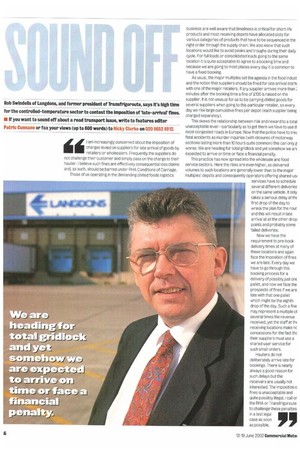6 Iam increasingly engjy conceredabouttheimposil
Page 46

If you've noticed an error in this article please click here to report it so we can fix it.
ion of charges levidonsuppliersforlatearrivalofgos by retailers or wholesalers. Frequently the suppliers do not challenge their customer and simply pass on the charge to their haulier. I believe such fines are effectively consequential loss claims and, as such, should be barred under RHA Conditions of Carriage. Those of us operating in the demanding chilled foods logistics business are well aware that timeliness is critical for short-life products and most receiving depots have allocated slots for various categories of products that have to be sequenced in the right order through the supply chain. We also know that such locations would like to avoid peaks and troughs during their daily cycle. For full loads or consolidated loads going to the same location it is quite acceptable to agree to a booking time and because we are going to most places every day it is common to have a fixed booking.
As usual, the major multiples set the agenda in the food indust and the notion that suppliers should be fined for late arrival start( with one of the major retailers. If any supplier arrives more than "E minutes after the booking time a fine of £100 is raised on the supplier. It is not unusual for us to be carrying chilled goods for several suppliers when going to this particular retailer, so every day we risk large cumulative fines per depot (each supplier being charged separately).
This skews the relationship between risk and reward to a total unacceptable level—particularly as to get there we have to use ti most congested roads in Europe. Now that the police have to tree fatal accidents as murder inquiries (with closures of motorway sections lasting more than 10 hours quite common) this can only g worse. We are heading for total gridlock and yet somehow we art expected to arrive on time or face a financial penalty.
This practice has now spread into the wholesale and food service sectors. Here the risks are even higher, as delivered volumes to such locations are generally lower than to the major multiples' depots and consequently operators offering shared-usi services have to schedule several different deliveries on the same vehicle, it only takes a serious delay at thE first drop of the day to wreck the plan for the rout and this will result in late arrival at all the other drop points and probably some failed deliveries.
Now we have the requirement to pre-book delivery times at many of these locations and again face the imposition of fines we are late. Every day we have to go through this booking process for a delivery of possiblyjust onE pallet, and now we face the prospects of fines if we are late with that one pallet which might be the eighth drop of the day. Such a fine may represent a multiple oi several times the revenue received, yet the staff at thE receiving locations make nc concessions for the fact the their suppliers must use a shared-user service for such small orders.
Hauliers do not deliberately arrive late for bookings. There is nearly always a good reason for such delays but the receivers are usually not interested. The imposition fines is unacceptable and quite possibly illegal. 1 call or the RHA or Transfrigoroute to challenge these penalties in a test legal case as soon as possible.




















































































































































